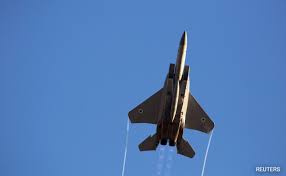Exploring Iran and Israel’s Air Capabilities: Fighter Jets, Missiles, Drones

Credit : NDTV News
19.04.2024 : Recent events have heightened attention on the air defense capabilities of Iran and Israel, especially after Iran’s direct attack on Israel in April. Understanding the air arsenal of both nations sheds light on their military strategies and potential responses.
IRAN’S AIR CAPABILITIES
Iran’s air force faces limitations due to international sanctions, resulting in a smaller fleet of strike aircraft primarily consisting of Russian and US models from before 1979. The country also boasts a significant arsenal of pilotless drones and surface-to-surface missiles, including long-range variants capable of carrying sizable warheads. Tehran’s air defense relies on a mix of Russian and domestically produced systems like the S-300 and Bavar-373.
ISRAEL’S AIR DEFENSE
Israel possesses an advanced air force equipped with F-15, F-16, and F-35 jet fighters, alongside innovative drone technology like the Heron. While lacking long-range bombers, Israel compensates with refueling capabilities for its fighters. The country is also believed to have developed long-range surface-to-surface missiles and maintains a multi-layer aerial defense system, including the Arrow-3 for ballistic missile interception and the Iron Dome for shorter-range threats.
THE FUTURE OF AIR DEFENSE
Both nations continue to invest in upgrading and expanding their air capabilities, adapting to evolving threats and technological advancements. While Israel benefits from strong defense alliances and advanced systems, Iran’s strategies often focus on asymmetrical warfare and leveraging its missile and drone capabilities.
As tensions persist in the region, the dynamics of air power and defense strategies play a crucial role in shaping geopolitical outcomes. Stay informed as developments unfold in this complex arena of military capabilities.

